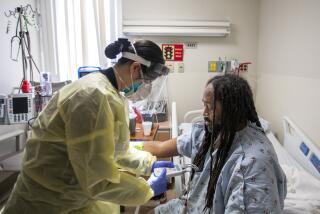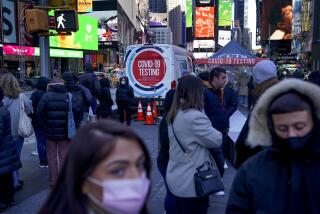New York governor seeks to tamp down criticism of Ebola quarantine
- Share via
Reporting from New York — Healthcare workers who fly into New York after treating Ebola patients in Africa will be quarantined at home for 21 days, with twice-daily unannounced visits from public health workers to ensure they do not go out and to check them for illness, Gov. Andrew Cuomo said Sunday as he sought to quell criticism of the new policy.
At a news conference, Cuomo said returning doctors, nurses and other healthcare workers would not be taken from the airport to hospitals unless they showed fevers or other Ebola-like symptoms during airport screenings by local, state and federal health officials. Those who arrived in New York but who do not live there would be put up in hotels or other facilities for the duration of the 21-day Ebola virus incubation period, Cuomo said.
The governor appeared alongside Mayor Bill de Blasio during the news briefing, which was aimed at presenting a show of unity as the nation’s largest city deals with the anxiety of its first Ebola case: a doctor who fell ill after returning from treating Ebola patients in Guinea.
Cuomo also clearly wanted to draw a distinction between New York’s quarantine system and that of New Jersey, where a nurse’s confinement in a tent after her arrival from Sierra Leone on Friday has drawn widespread criticism.
Earlier Sunday, De Blasio condemned the treatment of the nurse, Kaci Hickox, who has tested negative for Ebola. “What happened to her was inappropriate,” he said.
Cuomo and New Jersey Gov. Chris Christie surprised many, including De Blasio, when they announced on Friday that their states would mandate 21-day quarantines for all healthcare workers returning from treating Ebola patients in Africa. Illinois’ governor followed suit. Also facing quarantine are others who have had exposure to Ebola-infected people, whether or not they are healthcare workers.
“It’s not that they’re stopping their lives,” Cuomo said. “They have their full life. But if they become symptomatic, you will have limited the number of people they will have been in contact with.”
He said the policy took the U.S. Centers for Disease Control and Prevention guidelines, which advise self-monitoring, one step further. Had the mandatory quarantine system been in place when Dr. Craig Spencer returned from treating Ebola patients in Guinea on Oct. 17, Cuomo said, officials would not have had to track his movements across the city in the days before he fell ill.
“It’s much easier if the person is home,” Cuomo said, adding that people in quarantine would be permitted to have visitors and to be with their families.
He compared it to Army reservists returning from deployment and said employers would be expected to pay quarantined individuals during their 21 days’ confinement. “If their organization does not pay for the three weeks, we will,” Cuomo said.
The city’s health commissioner, Dr. Mary Bassett, estimated that only one or two people arriving at New York’s John F. Kennedy International Airport each day would fall into the category of people facing possible quarantine. All passengers arriving from Guinea, Liberia and Sierra Leone will be questioned by city, state and federal health officials upon arrival, and will have their temperatures taken.
Those not required to be quarantined will be subject to 21 days of monitoring, which could include reporting their temperatures daily to healthcare workers.
It was not clear what, if any, effect New York’s plan would have on New Jersey, where the medical aid group Doctors Without Borders said that Hickox was being confined to an unheated tent on the grounds of Newark University Hospital. Hickox took to CNN and to the pages of the Dallas Morning News to say she had been brusquely interrogated in Newark upon landing on Friday. She told CNN that the tent had a port-a-potty and no shower.
“While she is bring provided with food and water, the tent is not heated and she is dressed in uncomfortable paper scrubs,” Doctors Without Borders said Sunday. “She was permitted to bring personal belongings into the tent.”
Christie has defended his quarantine measures, but earlier Sunday, De Blasio blasted Hickox’s treatment. “This hero, coming back from the front, doing the right thing, was treated with disrespect, was treated as if she has done something wrong, which she hasn’t,” De Blasio said.
In a late-night statement, the New Jersey governor’s office did not directly address the nurse’s case but said: “New Jersey is not changing its quarantine protocol. The protocol is clear that a New Jersey resident with no symptoms, but who has come into contact with someone with Ebola, such as a healthcare provider, would be subject to a mandatory quarantine order and quarantined at home. Nonresidents would be transported to their homes if feasible and, if not, quarantined in New Jersey.”
Hickox lives in northern Maine.
Cuomo said New York’s goal was to “treat these people who are coming back with extreme sensitivity.” He said he did not anticipate anyone resisting the quarantine rules and described the healthcare workers going to fight Ebola in Africa as warriors going into battle against the virus.
“I’m sure they’re going to be understanding of our concerns,” he said.
At Bellevue Hospital in Manhattan, where Spencer, 33, is being treated, officials said Sunday that he remained in serious but stable condition. Spencer’s fiancee is in quarantine in the couple’s apartment. Two other friends also are in quarantine.
Twitter: @tinasusman
Matt Pearce in Los Angeles and Carlos Sadovi in Chicago contributed to this report.
More to Read
Sign up for Essential California
The most important California stories and recommendations in your inbox every morning.
You may occasionally receive promotional content from the Los Angeles Times.











